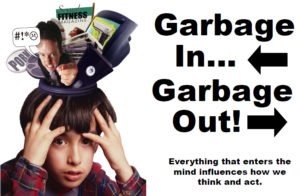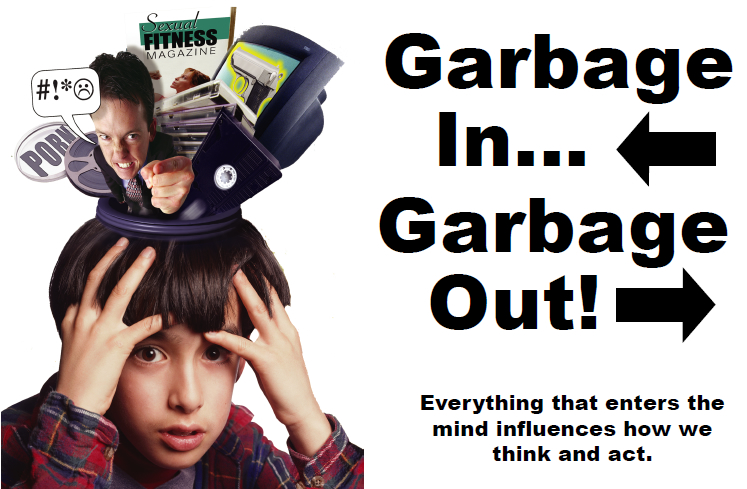Teaching Story Transitions 3: Start With God’s Story
So far in this series, we have explored several don’ts — discernment methods Christians often practice that are not based in Scripture. Part 1 and part 2 explored these:

- Drawing “fuzzy boundaries” is not Biblical discernment. Parents and Christian leaders ultimately have no reasons besides “I said so” to say one thing is good and another bad. Children, as they grow, may soon see right through these “standards.”
- Having few to no boundaries at all is also not Biblical, and unhelpful to children.
- Both of these views are based on the false idea that children are basically good!
- By contrast, the Biblical motive for enjoying stories and media is instead to discern and enjoy such a story or creative work, for the glory of God and for our benefit.
How do we reject the false notions, and replace them with truth? With none other than the true “story” that every Christian professes to believe and follow: the Scripture, God’s Word.
Rejecting un-Biblical discernment
1. Protecting your child’s “innocence” is a myth. In fact, protecting your children from outside evils, in an attempt to protect their “innocence,” is not the gospel.
Your children are not innocent (Rom. 3:10-18, 23). Instead they’re merely one decision away from gross and immoral sin. So why may we think they’re “innocent”? Maybe because we don’t think lying and disobeying one’s parents are as evil as God says (Rom. 1:29-31).
So beware the temptation to think of discernment in terms of “protection” from outside evils. If you believe the Bible, evil desires have already infiltrated your child’s heart. You cannot protect your children from evil because they are already evil! You cannot save them from this evil world because you cannot save them from themselves. Even if you could protect them from sinful outside influences, you still cannot protect them from themselves.
The problem is not your children being exposed to evil, but that your children desire evil.

This is a common idea, but does it match Scripture’s portrayal of sin’s real source in the human heart?
The problem is not that evil exists; the problem is we are evil. Yes, we also need protection from this evil world, but true protection is only through being reborn in Christ. Our minds must be renewed through the Spirit’s influence of the Word of God to our lives. We must be reborn in Christ (John 3:3), and our minds must be renewed by God’s Word (Rom. 12:2).
As Christian parents, teachers, and leaders, we must realize that children are sinners. Thus, we must provide ways for children to see their need to submit to God through Christ, Scripture, and their conscience, so that regardless of what sins they encounter, they still have the tools to submit to God instead of succumbing to evil.
I have mentioned that Scripture is the key to discernment. Yet we must also admit that God’s Word itself details many evils! Some are so perverted that even most unbelievers reject reading about them: necrophilia, bestiality, incest, orgies, rape, murder, etc.
So why does God’s Word show them? To show our sin contrasted with our magnificent God, thus revealing our sin and sending us running to Jesus Christ for salvation.
Thus, should children of all ages be exposed to such evils in Scripture? The answer is not easy. That’s why Christian parents, teachers, and leaders must first themselves practice discernment. Of course, we will likely not always agree on when, for example, an eight-year-old should read a chapter like Judges 19 (although if you have given him a Bible, and he is a boy, chances are he has already found it!). That’s why what follows is my opinion as a Christian pastor, husband, and father. My words also must be compared with Scripture.
2. Parents may choose when to expose his or her children to various evils in Scripture, but if you wait too long, your surrounding culture(s) will choose for you.
As parents and Christian leaders, we must constantly examine and discern our cultures. Based on those, we can anticipate when our children will be exposed to various evils, and teach them how to practice Christian discernment, as preemptive strikes.
For example, recently in my church’s van, an eight-year-old boy asked me an inappropriate question about something he heard in a movie. Because of the constant barrage of media all around us, this kind of situation is already inevitable. That chance is more than doubled if your children spent time around older children, or especially children whose parents do not practice discernment. They will be exposed to various evils sooner than you want!
That’s why you must anticipate this exposure. You must be active to teach your children a Biblical worldview, before inevitable other cultures teach them an un-Biblical worldview.
Replacing with Biblical discernment
 That sounds wonderful. Most of you are by now agreeing. But if you’re a parent, you may be asking how that works. How do parents know at what pace to move for the sake of their children? From the 12-year-old who seem unfazed by written violence and perhaps should be more worried about it, to the six-year-old who would have nightmares about cartoons?
That sounds wonderful. Most of you are by now agreeing. But if you’re a parent, you may be asking how that works. How do parents know at what pace to move for the sake of their children? From the 12-year-old who seem unfazed by written violence and perhaps should be more worried about it, to the six-year-old who would have nightmares about cartoons?
We certainly can’t claim this process will be the same for every family and every growing and maturing child. But we can suggest some general guiding principles.
That brings us back to a concept introduced at the end of this series’ part 1. It is also the beginning of how we may think more positively, replacing the bad discernment principles and practices we may have absorbed from our cultures with good and Biblical ones.
3. To grow in discernment, we must teach children the entire true Story of Scripture.
Because this is a lifelong process, we need to provide our children with a basic summary of Scripture, a foundation upon which to build their entire view of God, His creation, and man. In other words, we must train them to answer man’s basic worldview questions.
Nancy Pearcey, author of Total Truth and tutor at Rivendell Sanctuary, lists three worldview subjects that all humanity examines, questions, and answers:
- Creation: How did it all begin? Where did we come from?
- Fall: What went wrong? What is the source of evil and suffering?
- Redemption: What can we do about it? How can the world be set right again?
Almost every movie, TV show, song, or book seeks to answer at least one of the above questions. Many try to answer all of them. Your or your children’s friends, family, and acquaintances also seek to answer at least one of these questions.
Of course, the problem is that most of these stories and real-life people come up with very wrong answers, or even worse, some wrong answers and some right answers! That’s why discernment is essential for Christians to live in our evil age, where wickedness and lies are placed side-by-side and interlaced with truth.
For the Christian, there is only one sure Word that answers these questions — the true and first Story that God, the ultimate Storyteller, has written. According to Scripture:
- Creation: The only God who exists created all things, including you, for His own glory (Gen. 1; especially Gen. 1:26; Col. 1:16-17).
- Fall: Adam and Eve sinned against God, and all creation including humanity fell into sin (Gen. 3; Rom. 3:10-23; Rom. 8:20-22). Thus, all humans are sinners, which means that we are what is wrong with the world (Rom. 3:23; Gal. 3:22).
- Redemption: God the Son incarnate, Jesus Christ, came to earth to fix what Adam messed up. Jesus Christ — through His life, death, and resurrection — is the only answer for the sin problem (Rom. 8:1-39; John 14:6).
To enjoy God through all stories, we must take captive all ideas to Christ. We must destroy all the evil ideas the world exalts, for the God’s knowledge to reign supreme (2 Cor. 10:5).
Thus, instead of “helping” your children by sheltering them, truly help them by teaching them a Biblical view of the world upon which to build their lives. Though the world parades its wrong answers, if you help your children answer man’s basic worldview questions with Scripture, they will be able to grow in discerning the difference between truth and lies.
On the other hand, if you keep believing the myths that children are “innocent” or that they can be sheltered and kept “uncorrupted” by the world, you will not provide them with the necessary Biblical worldview so they may learn to live Godly lives in an evil age. You must discern what the world tells your children about who humans are, what’s wrong with the world, and how to fix it, so that you can then teach your children how these lies disagree with God’s true answers (Deut. 6:5-7). Our children will then be able to remain distinctly Christian in spite of living in a progressively unchristian world.
Much of this takes a monumental education effort — sometimes a literal education. In part 4, we’ll explore how one education method, classical education, may offer parents guidance.






























These are wonderful articles. I was a little worried because I have a 4 year old girl and I want her to know the truths the whole bible has to offer. I purchased an NIrV bible for her, people had concerns over this translation because the terminology they used is the basic easy to understand stuff. So instead of Lot’s neighbors trying “to know” the angels they are trying “to have sex with them”. Same intentions, plainer words. In searching for guidance I found these articles. WONDERFUL. Last night during my devotions I was reading in Luke when Jesus condemns those who cause the little ones to stumble. There is more than one way to do this (there are 10,000 ways a day to do this!) The idea that using God’s truth to shelter your children instead of ignorance and naivete is a kind of revelation and I praise God for it!
This is an area of my life that I have been praying about recently. I have struggled with “where to draw the line” on media for since I was in Jr. High. My parents encouraged me to seek God concerning this issue. They would not just give me an answer of “Do this, or Don’t do that.” They said I must figure it out for myself. They talked about the media they did not permit in the house and why they had done so. “We won’t tell you what you can or can’t read/watch because it is not our job to monitor what you put in your brain for your whole life. We can, however, dictate what comes in and out of the doors of our house. What you read/watch, you will have to answer for it to Christ. We will have to answer how we trained you.”
I never truly sought the Lord because I feared He would ask me to give up something I like. Today, I felt the Lord telling me that my issue is not a media issue but a heart issue. If you feel God says NO then that means no, and you should not be entangled in something that you can’t put it down. That is the cost of living for Christ. I am not living for myself. Once, I deal with the issue of my heart – WHAT HE SAYS GOES, IMMEDIATELY COMPLETELY REGARDLESS OF UNDERSTANDING, I can begin to look at my life and say what needs to go and what can say. (Now, I don’t want to stay with just knowing His acts and the dos and don’ts. I want to move to knowing His ways and the whys.) I don’t know where this is going to take me in my walk with God, but I’m excited about it. If God asks me to give it all up, I will be willing. If God asks me to give some up, I will be willing. Then I will enjoy what God has for me with no guilt or condemnation!!
If we go to God with our minds already made up, we will be like Balaam the prophet. He was an Israelite who was asked to curse Israel, God’s chosen people. He was offered a lot of money to do so. He prayed, because he really wanted the money, and God said NO. They offered him more money so Balaam went and asked God again. God said go ahead. On the way to curse Israel, God was angry and sent an angel to slay Balaam. (He was saved but that’s not important here.) Balaam came to God with his mind already set on an answer. God gave him the answer Balaam wanted to hear, but judgment came on Balaam because he was not truly submitted to God.
Anyways, I plan on praying about what I have read here. I want to know God’s heart on this issue, not what my heart/flesh desires on this issue. May the desires of my heart and yours begin to reflect God’s desires!!
Blessings!!!!